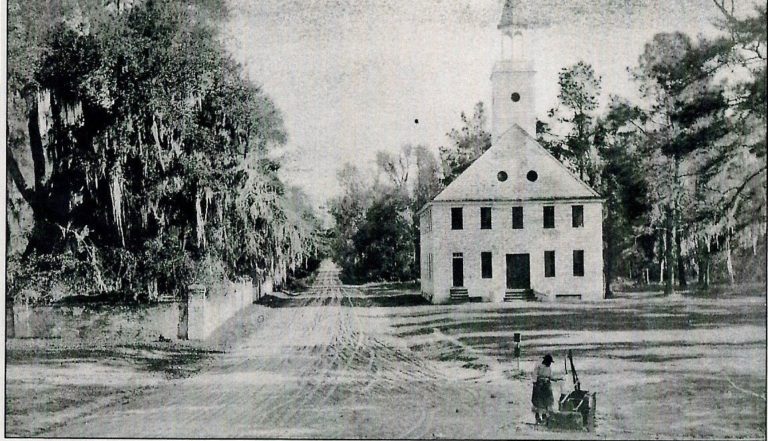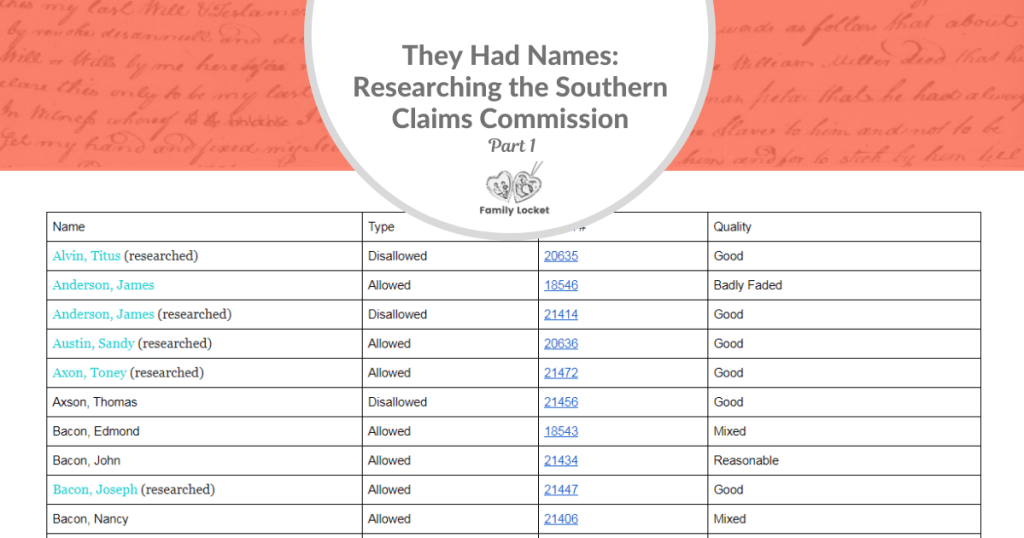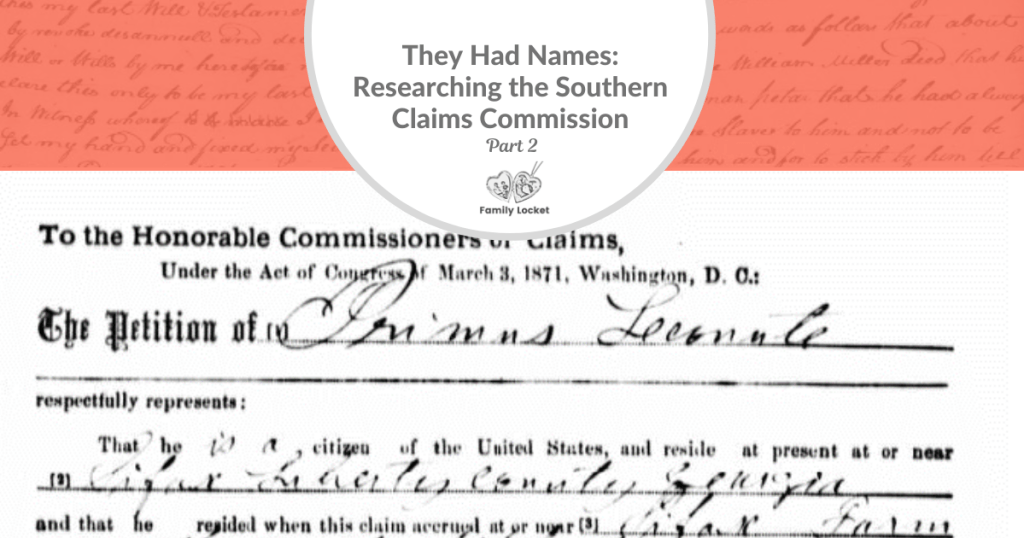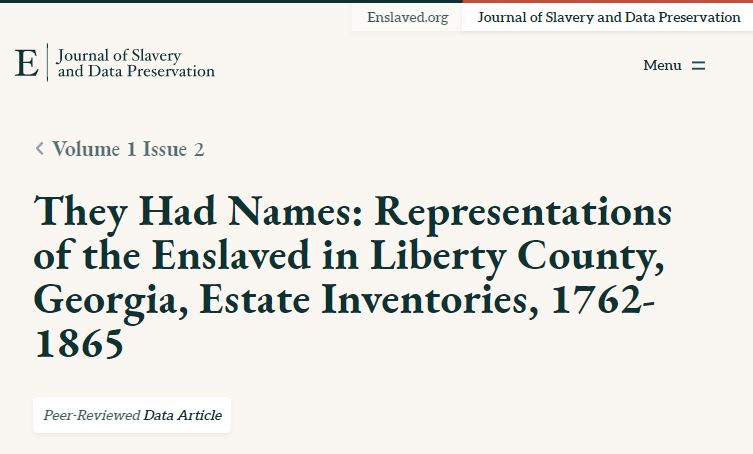Has your genealogy research led you to an African American family line in Liberty County, Georgia?
Have you struggled to find information on this family line from before Emancipation?
Many pre-Emancipation records naming African Americans in Liberty County exist, but the summaries and indexes available online often omit their names.
This site fills that gap.
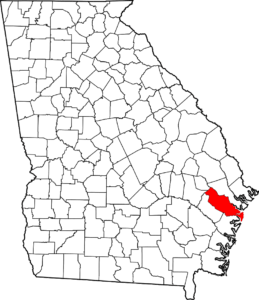
Liberty County planter families often intermarried, and it was relatively common to keep enslaved people within families through marriage contracts, inheritance, and gifts to children. Much of this was documented in the legal system.
This means that Liberty County probate and deed records contain many references to enslaved people, and most of these records are available online at FamilySearch.org and Ancestry.com, but even when they are indexed there, the names of the enslaved people are not included in the indexing (though Ancestry is beginning to remedy this).
This site is the solution to that problem. It contains summaries and transcriptions of these Liberty County records with more than 37,000 references to named African Americans — enslaved and free — and is completely searchable. Everything here is free.
Is this genealogy or history? It’s both! With this data, descendants can find their long-lost families…and historians and researchers can put together the story of a community and analyze its history within a greater historical context.
In 2023, the They Had Names website received an award from the Board of Regents of the University System of Georgia for Excellence in Documenting Georgia’s History.
Contents of This Site
What if you are not researching Liberty County? This list also identifies the kinds of records you can seek in your county of interest.
- 160+ wills with more than 1220 names of enslaved people (1790-1865)
- 1800+ deeds (bills of sale, mortgages, marriage contracts, gift deeds) with 12,700+ names (1777-1783, 1785-1865)
- 35 colonial-era estate inventories (541 names) and wills (177 names) (1762-1775)
- A sortable spreadsheet with 3889 references to African American members of the Midway Church, 1756-1864
- A list of free persons of color, 1852-1865
- 670+ estate inventories and divisions with more than 17,300 names (1786-1865)
- A list of 1151 African Americans– enslaved and free – who attended churches in Liberty County’s 15th District in 1846
- Over 70 U.S. Southern Claims Commission petitions, fully transcribed and many fully researched.
- Liberty County Superior Court antebellum records naming African Americans, enslaved and free
- NEW -> Postbellum land sales involving African Americans recorded 1884-1886 (90+ records)
- NEW -> Lists of personal property owned by freedmen after the Civil War under the Georgia Homestead Act
- Freedmen’s Bureau Post-War Labor Contracts (1866-1868 – 39 contracts involving 654 freedpeople)
- Postbellum orphan bonds & apprenticeships (1866-1879)
- African American marriages, 1867-1896
- Divorces (for all races), 1865-1915
History of Liberty County
In the 1750s, the British Colony of Georgia made slavery legal within the colony. A group of European-descended planters and slaveowners in areas of South Carolina, most notably near Dorchester, applied for and received land grants. They began moving to the Midway area in what was then St. Johns Parish, now Liberty County, and brought with them about three times their number in enslaved Africa-descended people, who were forced to create and work the rice, cotton, and indigo plantations. Liberty County has been majority African American ever since. Due to harsh conditions in coastal Georgia, the planter families often moved inland to higher ground for parts of the year, leaving the enslaved people isolated on the plantations where they developed their unique Geechee culture.
Much of life in the Midway area centered around the Midway Congregational Church and Society, founded by the planters in 1752. The church building was burned by the British during the Revolutionary War, but was re-built in 1792, and that building still stands today on Highway 17. The Midway Church has had both White and Black members since its earliest days. The first Black members were admitted on June 26, 1756: Scipio and Judy. Records of the names of all the Africa-descended church members still exist today and have been transcribed on this site. In 1867, after the Civil War, as many of the White members fled the area or left for other churches, the Black members petitioned to rent the building and form their own Church. They thus saved this historic church building. These members later founded the Midway First Presbyterian Church. The First African Baptist Church in Riceboro is the oldest African American church still existing in Liberty County, dating from before the Civil War.
Are you using the 1870 Liberty County federal census? STOP and READ THIS. A fraudulent census was conducted that summer, and both it and the “true” census conducted that fall are online at FamilySearch and Ancestry. If it has Holcombe’s name as the enumerator, DON’T USE IT. Read more here.
recent additions to the site
Election Supervisors, 1874
On October 28, 1874, the Savannah Morning News reported: Supervisors of Elections List of Appointments by Judge Erskine The following is the list of appointments of Supervisors at the approaching election, comprising a portion of the First, Second and Fifth Districts: First District [Omitted non-Liberty County information and formatted Liberty County information for readability] Liberty County — Precinct, Hinesville–Augustus Law, RepublicanHenry Way, Democrat Precinct, Warnell’s Store–Steven Martin, RepublicanSamuel Martin, Democrat Precinct, 1132 G.M. DistrictIsrael Stevens,
Court Case: Pray vs. Woodruff for Betty (1786-8)
[Begin Transcript] GeorgiaTo the Honorable the Chief Justice of the Said State, and the Assistant Justices of Liberty County The Petition of Job PrayHumbly Sheweth that Joseph Woodruff Esqr of the County of Liberty is justly indebted to your petitioner in the sum of one hundred & seventy pounds, sixteen shillings and four pence species for a certain Negro Wench named Betty, and one hogshead molasses agreeable to the Annex’d Accounts, which the said Joseph
Personal Property of Marlborough Jones (1872)
[Begin Transcript] State of Georgia, Liberty County } To the Ordinary of Said CountyThe petition of Marlborough Jones sheweth that he is the head of a family, and in behalf of said family file files this his petition for an exemption of personalty under the laws of Georgia to be exempted from levy and sale and files the annexed schedule. Said property now in possession of petitioner in said county, being the crop raised by
Personal Property of Ben Howard (1872)
[Begin Transcript] State of Georgia, Liberty County } The following is a schedule of the personalty of Ben Howard, p.c., the head of a family claimed under the Homestead laws of this state, and filed with Ordinary of said County, for exemption under said laws, this 4th day of October 1872: to wit, One hundred & ninety bus. Corn val. at @1.00 pr bu 190.00 Thirty five bu rice val. at 1.00 pr bu. 35.00
Personal Property of William LeConte (1872)
[Begin Transcript] State of Georgia, Liberty County } Schedule of personalty of William LeConte p c, the head of a family, filed in the Ordinary’s office of said county this 4th day of October 1872, by Amo Harris p c agent of said LeConte, for exemption under the Homestead laws of this state, to wit:One hundred & eighty bu corn @ 1.00 pr bu $180.00Forty bus rice @ 1.00 pr bu $40.00Growing crop of cane
Personal Property of Amos Harris (1872)
[Begin Transcript]Georgia, Liberty County } To the Ordinary of Liberty CountyThe petition of Amo Harris sheweth that he is the head of a family and in behalf of said family desires an exemption of personalty to be exempt from levy and sale, the following personal property, under the laws of Georgia, and files the annexed schedule. All of said property now in possession of petitioner and being the crop raised in the present year in
How To Use This Site
This site is not indexed — every word is searchable. This means that you do not have to rely on an indexer’s sense of what is useful, but it also means you may have to page through more documents to find what you are seeking. Spellings of names varied wildly in earlier times, so alternative spellings of names have been added to the documents wherever possible. This means that you can find records here no matter which spelling you use for your search (e.g. Affy or Affee), but it is still wise to try various searches.
Tip: If you search for Thomas Mell on this site, you will find every document that has Thomas and that has Mell, which are many more documents than the ones that have the exact name Thomas Mell. To find documents with the name Thomas Mell, try these searches:
“Thomas Mell” — will return every document that has that exact sequence (i.e., not Thomas J. Mell)
Thomas Mell -n2 — will return every document in which “Thomas” and “Mell” occur within two words of each other (which will get you Thomas J. Mell, Thomas S. Mell, etc).
For an illustration of how to use this site, please see this case study: Finding Abram Houston.
Copyright & use of site information: Use of information from this site for your personal research and educational purposes is encouraged! For any other purposes, please contact me. I have compilations of the data in formats that may be useful to researchers.
Breaking the 1870 Census Barrier
People researching their African American ancestors often run into a seemingly impenetrable barrier at the 1870 census, prior to which records of enslaved people usually referred only to first names. Finding the name of the last enslaver is critical in tracing formerly enslaved people back further in time.
Liberty County researchers are extremely fortunate in that a large number of formerly enslaved people made Southern Claims Commission petitions in the 1870s. Testimony in these claims named previous enslavers.
Dr. Peggy Hargis, Associate Professor at Georgia Southern University (retired), created a remarkable list linking SCC claimants and witnesses to their former enslavers. Use this “enslaver -> enslaved” list to quickly find your ancestor, then search this site with the name of the former enslaver to find probate, deed, and church records with further information.
TheyHadNames has been transcribing all the legible Liberty County Southern Claims Commission case files and researching the claimants’ lives backward and forward in time. [Currently on hold waiting for NARA to re-open to obtain better quality images of some of the more illegible case files.] Check the index to see if your ancestor was a claimant or a witness, and click on the “Case Files and Research” link to read through the completed records.
Using the U.S. Southern Claims Commission Files in Your Research
Finding Aids
We add to this site on a regular basis but there are still many documents that may help in your search that are not here yet, so I have created finding aids, research guides, a bibliography and links to useful resources. Some of these are on my other website, Genealogy Trail’s Liberty County website.
Enslaved.org
A subset of this site, the estate inventories database, has been published in the Journal of Slavery and Data Preservation, a publication of Enslaved.org, which is a joint project of the University of Maryland, Michigan State University, and the Andrew W. Mellon Foundation.
Interested in learning more about Liberty County research or in getting ideas from this research to apply to your African American genealogy research? Use the form below to sign up to receive blog posts via email. These will be informal, mostly weekly, notes inspired by the week’s research. Unsubscribe at any time. This will never be used to try to sell you anything.
Need Help?
Feeling overwhelmed? I have developed a method for quickly researching people named in these records. If you email me (at jnscole@yahoo.com) with the information you know about your ancestor, I will be happy to search the site for you and prepare a report of my findings that you can use to further your research. This is free – everything on this site is and always will be free — and I will never use the information you give me for other purposes without your permission.
AAHGS Jean Sampson-scott award
They Had Names is so proud to have won the Jean Sampson-Scott Award, the second-highest award given by the Afro-American Historical and Genealogical Society (AAHGS). The award, which is for “a significant and measurable contribution to African American history and/or genealogy within the past two years,” was given at the AAHGS National Conference in October 2022. Thank you, AAHGS!
stories
Most of this site consists of transcriptions and abstracts of documents to help you find your ancestors. There are a few stories that have jumped out of the records and demanded to be told, though…
An 1818 Interracial Marriage in Liberty County
Perhaps the most surprising story of all is that of Elizabeth Anderson, a young woman of color, who legally married white planter and slaveowner William Foster in Liberty County in 1818. After the marriage, they and their four children lived in Liberty County until Williams death in 1825, when Elizabeth took the children and moved to Massachusetts. Read more.
The 1870 Holcombe Census Fiasco
In 1870, Charles R. Holcombe, a U.S. Marshall, completely fabricated the federal census he performed for Liberty County, Georgia. Who was Holcombe? His surprising history reveals red flags that should have prevented him from being in a position to conduct the census. Read more.
Henrietta Hamilton, Free Woman of Color
Henrietta (“Hetty”) Hamilton, a free woman of color born at the end of the 18th century, lived independently in Liberty County on 50 acres of land given her as a “life estate” by a wealthy white planter and slaveholder named Jacob Wood. When he sold the land, he conditioned the sale on continuation of her life estate. Henrietta Hamilton herself also held at least 12 African Americans enslaved during her lifetime before her death in 1868. Read more.
A Different Kind of Civil War Story
James and John Somersall were white brothers who lived in rice-growing, slave-owning Liberty County, Georgia. They were poor. They owned a few acres of land, grew their own food, milked their own cows, and didn’t own people.
John was in his late 30’s when the clouds of the Civil War appeared on the horizon, and his view of the matter was that he had nothing to fight for. His mother, Elizabeth, a widow, tried telling her neighbors that they shouldn’t fight to keep their slaves. She told them that if she did own slaves, even a lot of them, she would gladly give them up to keep the war away. John had to tell her to stop, that they were going to come for her and kill him for defending her. She stopped. Read more.
William McWhir: Irish-Born Educator, Clergyman, Slaveholder
William McWhir was at one time the most famous educator in Georgia. Most histories of his life omit entirely one of the most important pillars on which his life rested: he owned people. Read more.
Sent to Liberia by Jacob Wood
Jacob Wood was a traditional, wealthy and well connected planter of his time in Liberty and McIntosh Counties…except for one detail at the end of his life. His will directed that the people he held in slavery be sent to Haiti with the help of the well known Zephaniah Kingsley. Kingsley died before Wood, however, and instead 154 people he had held in bondage boarded the ship Chieftain on February 15, 1850, and sailed for Liberia. Read more.

Content Warning
Slavery was an evil institution. Nothing on this site is intended to suggest otherwise or support any narratives of “good slaveowners.”
Reading and transcribing old handwriting is hard work and there must certainly be mistakes on these pages. The original documents are always cited and are online; please consult them before you draw any conclusions.
These are historical documents and the original wording used is often extremely offensive. Original wording is indicated with quotation marks.
